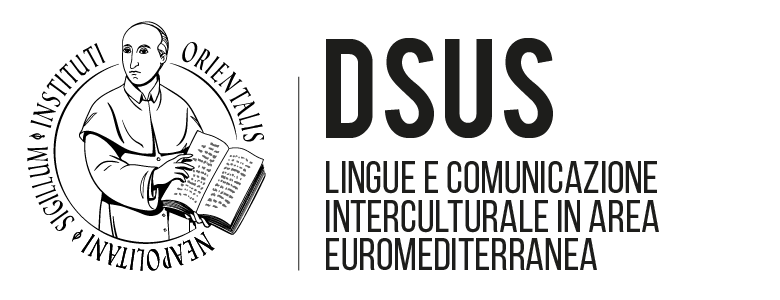
Location: Palazzo Giusso
Coordinator: Anna Mongibello
Admission: Open.
Language of instruction: Italian
How to apply: Requirements and admission procedures
> Notices from the coordinator: visit the notices section on Unifind
Course Overview
The Italian second-cycle degree program in Languages and Intercultural Communication in the Euro-Mediterranean Area (abbreviation: MLC) belongs to Degree Class LM-38 – Modern Languages for Communication and International Cooperation and shares its qualifying learning objectives. The program is designed to train graduates capable of responding to the evolving demands of the job market shaped by the intercultural nature of contemporary societies, with particular emphasis on linguistic and communicative skills relevant to the Euro-Mediterranean context.
To this end and giving ample space to critical knowledge in the field of communication, the program provides solid competences in linguistics, history, geography, law, socio-political studies, and ethics. The aim is to prepare graduates to operate effectively in diverse contexts of interaction and exchange between different languages and cultures that characterize the Euro-Mediterranean area.
The program places intercultural communication training at the forefront, along with a critical understanding of the changing roles of information and mass communication in contemporary society. It offers knowledge in linguistic analysis, sociolinguistic processes, and communication mechanisms. It aims to train not only language teachers specializing in the linguistic specificities of the Euro-Mediterranean region, but also professional profiles with expertise in mediating between cultural, historical, economic, and social areas linked to the chosen languages.
Graduates will be qualified to work in international relations — also in managerial positions —within companies, public administrations, NGOs, and local institutions, in international organizations for cooperation and development, in institutions dedicated to economic, social, and cultural integration, and in public entities dealing with the protection of immigrant languages and language policies in the EU.
The program is housed within the Department of Human and Social Sciences but includes faculty members from other departments of the University. The Degree Program Board is the governing body which, in addition to the responsibilities established by the University Statute, oversees the overall organization of the program, admission procedures, and educational offering. It defines admission and credit recognition criteria, appoints relevant committees, coordinates teaching schedules and course planning, manages student orientation, addresses any critical issues related to specific courses, monitors student progress, assigns academic tutors, organizes internships and training activities, and ensures regular communication about all aspects of the program.
For detailed information about the program and its regulation, please consult the relevant pages.
The Italian second-cycle degree program in Languages and Intercultural Communication in the Euro-Mediterranean Area (MLC) focuses on the growing demand for intercultural communication training, expressed in many professional fields, as well as on the evolving roles of mass media and communication in contemporary society. It offers a timely and appropriate response to the challenges facing the education sector, particularly the need to teach increasingly diverse and intercultural audiences.
The program structure is built on the close integration of an advanced two-year language track and a second, one-year language track (which may be extended through elective credits), along with a wide range of courses in history, philosophy, geography, economics, and social sciences. Students can personalize their academic pathway based on their interests, enhancing their linguistic competences to build a profile aligned with the program’s diverse career opportunities.
Graduates in Languages and Intercultural Communication in the Euro-Mediterranean Area may pursue careers as:
- trainers or “trainers of trainers” working with diverse groups in intercultural contexts (e.g. schools, social services, public and private organizations);
- experts in intercultural contexts for print, broadcast, or digital media;
- cultural mediators for public or private institutions, including those engaged in international relations and cultural exchange;
- linguistic and cultural liaisons for companies operating in non-European contexts;
- professionals supporting the social and professional integration of foreign nationals in Italy, including collaboration with teachers in the acquisition of Italian as a second language;
- senior professionals involved in designing integrated communication environments, particularly in the planning and creation of multimedia products.
Requirements and access procedures
To join the Degree Course in Languages and Intercultural Communication in the Euro-Mediterranean Area, applicants must hold a degree consistent with the international relations field, under the old or new system, or an equivalent qualification obtained abroad. A dedicated committee evaluates each candidate’s curriculum, considering their degree, certified educational and language experience, and preparation in relevant fields such as law, economics, history, politics, and social studies.
For further information, please refer to the Access Methods page.
Study plans and course organization
Everything you need to know about the course structure, rules, and study plans.
Teaching and Training Activities
This section helps you organize your university career in the best possible way. Here you can consult class schedules, exam dates, and practical course activities. You will also find information on other educational activities, workshops, internships, and tutoring services designed to accompany you step by step throughout your studies and help you build a well-rounded experience, both in the classroom and in the working world.
Training activities, workshops, internships and work placements
You will also find information on other training activities, workshops and internships, to build a complete experience that integrates the classroom and the world of work.
Study support and guidance
Services to support learning and active participation.
Support, assistance and suggestions
This section contains all the information you need about student support offices and services.
✉️ If you have any suggestions, please write to mlcmediterraneo@unior.it
Quality and transparency
Tools for learning about how the course works and how it is assessed.
